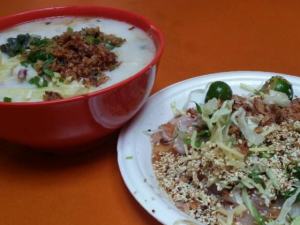Food stalls have been ordered to stop selling Chinese-style raw-fish dishes until they can comply with stipulated guidelines, after investigations by the Ministry of Health (MOH) found a definite link between eating these dishes and Group B Streptococcus (GBS) infection, which can potentially cause permanent disability and even death in severe cases.
 To date, two persons have died from GBS infections this year, said MOH today (Nov 27), without providing details. One of the cases was not linked to the ongoing outbreak, and the other is being investigated.
To date, two persons have died from GBS infections this year, said MOH today (Nov 27), without providing details. One of the cases was not linked to the ongoing outbreak, and the other is being investigated.
MOH said it has been notified of 355 cases of GBS infections so far. Of these, about 150 cases had the Sequence Type (ST) 283 strain which causes Type III GBS disease. In comparison, there were, on average, 150 cases of GBS infections per year from 2011 to last year.
The consumption of Chinese-style ready-to-eat raw-fish dishes was found to be associated with Type III GBS disease, said the National Environment Agency (NEA) in a joint media briefing yesterday with the MOH and the Agri-Food and Veterinary Authority of Singapore (AVA). MOH had said previously it has not found any links between the GBS infection and the consumption of Japanese raw meat or fish dish sashimi. Examples of popular Chinese-style raw-fish dishes are “yusheng”, which is usually eaten during Chinese New Year, and raw-fish porridge.
Over 70 stalls selling Chinese-style raw fish dishes have been identified by the authorities. NEA met with the owners of some of these stalls to brief them on its directive and guidelines, which include buying fish from suppliers which can provide certification on the health of the fish from authorities in the country of origin. Other measures include proper cold chain management, such as keeping fish for raw consumption chilled at the right temperature, and proper hygiene practices like using separate kitchen tools for preparing raw fish.
